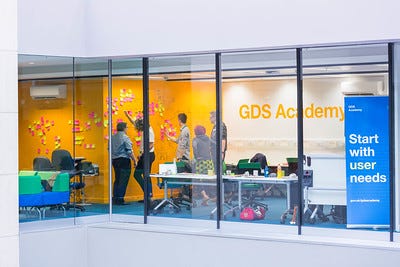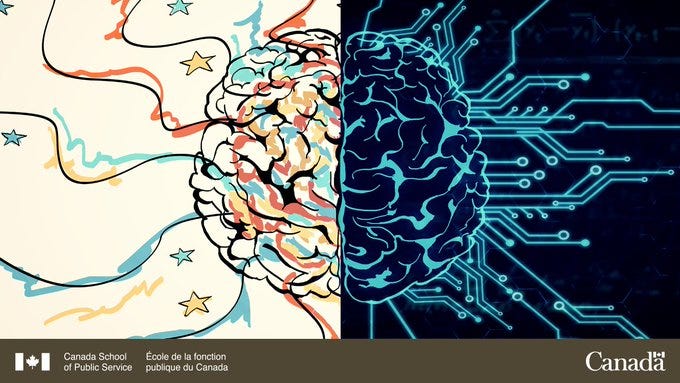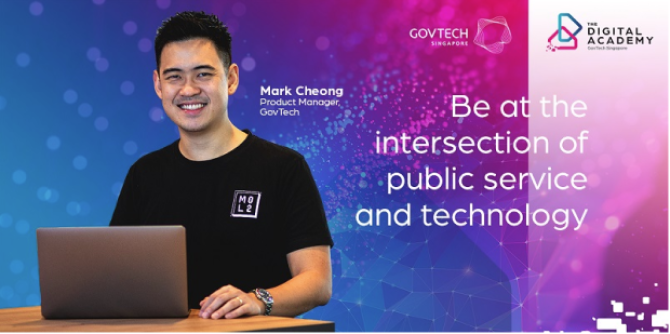The inner workings of successful Digital Academies
Originally published on Medium

Imitation is the sincerest form of flattery. And in the digital world, they take this to heart. Instead of starting a project from scratch, the best practice is to look for what already exists, adapt, and enhance it.
We, as all good digital teams should, are following suit. To help us figure out what the BC Digital Academy should be when it grows up, we cast our net out around the globe looking for established digital academies. In my last post, I shared my findings on what it takes to support employees on their digital learning journey. Next, we looked at how other public sectors were addressing this. Did they have dedicated digital academies? Who and what are they focusing on? Can we steal, oops… I mean repurpose, their format and content?
But, as the Google gods reminded me, getting behind an organization’s well-guarded online wall to see how they support employees is mostly wishful thinking. That, and the newness of employee digital academies, quickly slimmed down my search.
Thankfully, the tides are turning, and organizations are embracing the notion of working in the open. Especially those public sectors embracing digital principles. Learning partners and vendors are also posting articles on organizations they work with and providing an inside peek. All of this provides us with some valuable intel.
Today, we’re going to look at how three large public sector digital academies are navigating all of these uncharted waters.
Public Sector Digital Academies
Many countries provide digital learning to their public servants but few have a dedicated digital academy. Long term it will be interesting to find out if they both achieve the same end results.
Countries that surfaced: Argentina, Australia, Brazil, Canada, Chile, Dubai, Germany, Israel, Scotland, Singapore, Taiwan, and the United Kingdom (UK). And no, the USA does not have a federal digital academy.
Picking three countries to do a deep dive on, was mainly determined by how much material was publicly available. Other considerations were if they had a dedicated digital academy and to find ones at different stages in their journey. The UK, Canada, and Singapore fit the bill.

United Kingdom (UK)
The Government Digital Services (GDS) Academy was established in 2014 to help employees working in digital understand how government was working in new ways to build services for its users. In 2016, their scope was expanded to support the development of digital skills and awareness for all 480,000 public servants. Their recently released digital roadmap may impact their future focus to support items listed under Mission Five: Digital Skills at Scale.
The GDS Academy inspired similar initiatives in Scotland and Canada. Over the last few years, the UK appears to be making a shift away from its centralized learning approach. In some cases gov.uk agencies are taking on larger roles in creating and managing their digital training and talent. Rather than going broad, the National Health Service (NHS) Digital Academy, DWP Digital, and other agencies, are going deep, teaching sector-specific skills. In other cases, they are supporting partnerships crossing multiple public sectors.
Related departments and initiatives
- GDS Academy — main page and course catalogue.
- Government Digital Services (GDS) — implementing digital.
- Central Digital & Data Office — digital and technology strategy and policy.
- Digital, Data, and Technology Profession — supporting people working on digital transformation.
Approach
There is a small amount of content relevant to all public servants and digital teams. The primary focus is on foundational learning. Delivery methods: online, in-person and micro-bites. Other learning partnerships expand the audience, focuses, delivery methods, and content.
Strategy, capabilities, user research
- Digital, Data, and Technology Profession Capability Framework — roles and skills needed.
Knowledge
Learning content and registration is found on the GDS Academy page and does not appear to be integrated with the organization’s main learning platform. Currently content includes: 17 courses. Additional learning content can be found by searching through the blogs.
Focuses
Mainstream
- Various courses — on digital, agile, user experience, and trending topics.
- Digital and Agile Bitesize Basics — 10 online modules introducing digital and agile for all public servants.
Leadership
- Digital Leadership course — for senior leaders without a technology background. An overview of digital transformation in government and how they can support and govern it.
- Digital and Agile Leadership course — for senior leaders supporting digital transformation and overseeing joined-up, trusted services that respond to user needs.
Digital teams
- Various courses — for teams starting out all the way through advanced agile practices.
- Role-specific courses— business analyst, delivery manager, product manager, service owner.
Skill development
- Digital, Data, Technology, and Cyber Fast Stream — a three-year program to develop expertise and experience working in a number of positions under one of the four pillars: digital, data, technology, or cyber.
- Civil Service Data Challenge — for all levels, build staff skills and launch new data projects through a competition using employee-generated ideas on how to make better use of data.
Unique offerings
Employee communities
- Profiled within the blogs topics, in particular Digital People.
Sector-specific digital program
While the NHS Digital Academy is not directly related to the GDS Academy, it is worth noting their format as it demonstrates that a single government digital academy likely cannot serve all. They have also created a number of programs, a vision/strategy, and a digital capabilities framework that could easily be modified to suit other specialty needs.
The NHS Digital Academy launched in 2017 and focuses on specialist learning within the healthcare sector. They work in collaboration with the Imperial College. While most of their learning & development is highly specialized, there appears to be some duplication of foundational courses that the GDS Academy also offers.
They focus on increasing their workforce’s skills, supporting a new generation of leaders who can drive the transformation of the NHS, and producing leaders in health innovation. Their key programs are:
- Digital Readiness Education Program — 6 foundational workstreams for all staff, leaders, and digital experts.
- Digital Futures Program — academic learning for mixed background teams of senior leaders. Partnership with Yale University.
- Topol Digital Fellowships (12 months) — learning and hands-on application working on a workplace digital change project. For all levels of clinical staff, including nurses, doctors, dentists, pharmacists, and scientists.
- Digital Health Leadership Program (12 months) — fully accredited Postgraduate diploma targeted at digital change leaders.
- Digital Boards Development Program — foundational program for board members through continuous learning using resources, webinars, and peer learnings.
- Community and ambassador networks.
Supports/Partnerships
Internal
The GDS Academy provides training at various offices and pop-up academies to all levels of public sectors in the country through a training agreement.
External
apolitical courses — a partnership to develop learning with UK-specific and general content that can be accessed by any public servant.
The UK is taking a more collaborative approach to digital learning. Partnerships are manifesting with the private sector and various levels of public sectors from around the country. The intent appears to be in support of the best use of resources and common learning foundations. Three programs in particular stood out: Local Digital, Digital Leaders, and Public School of Technology.
Local Digital — a joint endeavour between the GDS, the UK Department for Levelling Up, and numerous local authorities and public sectors from across the UK to work on a shared vision: to deliver more user-centered, cost-effective local public services through open, collaborative, and reusable work. To support this, over 40 online courses covering a variety of topics, are offered in the digital training library. Content comes from a variety of organizations and peer learning is supported.
Digital Leaders — a shared professional online space and face-to-face program for UK leaders across all sectors promoting effective, long-term digital transformation. The organization relies on private-sector partners and focuses on key digital topics and offer events, programs, networking, thought leadership, and best practices.
Public School of Technology — the organization identified a digital skill gap in the UK public sector. Led by an ecosystem of digital innovators, entrepreneurs, and investors they equip public servants with the skills, knowledge, and tools to grasp the opportunities of the digital age. They use hands-on learning, networks, and placement in startups to help learners operate confidently with new technologies, business models, working cultures, and partnerships.

Canada
The Canada School of Public Service (CSPS) Digital Academy was established in 2018 to help all 250,000 public servants gain the knowledge, skills, and mindsets they need in the digital age. It supports the principles of Canada’s Beyond2020 initiative for an agile, inclusive, and equipped workforce and advocates for a digital-first approach that aligns with Canada’s Digital Standards. Digital learning content is captured on the Digital Academy’s site and integrated into the government’s main learning catalogue and registration system. They were inspired by the UK’s GDS Academy.
Related departments and initiatives
- CSPS Digital Academy — main site and course catalogue.
- Canadian School of Public Service — the main learning organization and course catalogue.
- Digital Government — digital strategy and direction.
Approach
There is a wide variety of content relevant to all public servants. The primary focus is on foundational learning of a few key topics with some advanced course offerings. Delivery methods: online, in-person, self-paced, and micro-bites.
Strategy, capabilities, user research
- Learner User Study (2021) — survey to gain insights into public servants’ knowledge and skills levels in digital areas as well as into learning habits, preferences, and interests.
- Learning paths — guide the way for digital, data, cloud, human-centered design, and leadership. Material is pulled in from various channels and in different formats.
Knowledge
Learning content is integrated into CSPS’s Learning Catalogue, creating a single channel for learners to access. Currently the Digital, Data, and Design content includes: 75 courses, 50 blog posts, 6 job aids, 20 podcasts, 35 videos, and 1 event.
Focuses
Mainstream
- Discover Series — a suite of foundational courses. Introducing new mindsets, skills, and techniques to help public servants succeed in the digital era. Streams are: Digital, Data, Agile, Cloud, Cyber Security, Trending Technology, and Digital for Leaders.
- Busrides — micro-learning. Much of the content is linked to in the CSPS Learning Catalogue. Employees are encouraged to contribute content (recommend tools, philosophies, perspectives) relevant to most public servants related to the discover series topics.
Leadership
- Discover Series: Discover Digital Leadership — introduces leaders to the culture, practices, and technologies.
- CSPS Learning Path for Executives — not digital specific, covers a broad range of topics. They offer an Executive Learning Concierge as a service to help executives find appropriate learning.
Data
- Discover Series: Discover Data — explores basic data concepts, data skills, and roles.
- GC Data Demo Library — a showcase of innovations from the community demonstrating the power of data to inform better policies, programs, and operations.
Skills
- Digital Accelerator — for established teams and their leaders to experiment with collaborative, open, human-centered, and iterative ways of defining problems and prototyping solutions. Uses a combination of hands-on workshops, peer learning, coaching, and mentoring. Participants apply skills in design thinking, user research, prototyping, product management, and agile to address a real business problem facing their organization.
- Canada’s Public Service Data Challenge 2022 — build staff skills and launch new data projects through a competition using employee-generated ideas on how to make better use of data.
Unique offerings
Employee communities
- GC Digital Community.
- Living Digital.
- Canadian Digital Government Connections — private channel, open to public servants from the federal, provincial, and local levels.
Supports/Partnerships
External
AWS DigiGov — a collaboration with Amazon Web Services and the University of Ottawa to develop this free, two-day program for the CSPS to show how to use the cloud to deliver citizen-centric digital services.
apolitical — partnership with apolitical and other public sectors to develop learning with Canadian-specific content that can be accessed by any public servant for free:
- How to be digital in the Canadian Public Service
- Continue being digital in the Canadian Public Service
- Data literacy 3.0: An online boot camp with Statistics Canada

Singapore
Singapore’s Digital Government Blueprint lays out a three-pronged approach to seamlessly integrate digital services and governing standards across three audiences: citizens, businesses, and public servants. Some of their learning is developed for and rolled out to public servants, then provided to broader audiences.
Digital training for more than 150,000 staff is offered through two sources. Foundational training for all staff is delivered through the Civil Service College (CSC). The program was launched in 2016, with a significant change in format made in 2018 giving them access to more than 2500 courses in a whole-of-government effort to support public sector transformation and the transformation of learning in the sector. Advanced training is delivered through the Digital Academy. It was launched in June 2021 as a ‘Practitioner for Practitioner’ academy with ICT programs developed by tech giants, contextualized for the public service.
Related departments and initiatives
- Digital Academy — main site and course catalogue.
- Civil Service College — main learning organization and course catalogue.
- GovTech Singapore — digital strategy and direction.
Approach
There is a significant amount of content found on the two learning sites. It is unclear if they are integrated to form a single learner profile. CSC focuses primarily on the foundations and four skillsets: digital skills, design thinking, systems thinking, and collaboration with citizens. The Digital Academy focuses on advanced and specialized training. Both look to connect learners across the entire public service by facilitating cross-agency social and peer-learning. Delivery methods: online, mobile app, in-person, self-paced, and micro-bites.
Strategy, capabilities, user research
- Digital Academy Mission.
- Digital Upskilling Guide — maps out courses based on job role and audience level.
- CSC Telegram Bot — learners can chat with the bot to receive program suggestions.
Knowledge
Content is available in multiple formats including courses, events, tech talks, webinars, videos, infographics, articles, quizzes, games, simulations, and bite-sized content.
Focuses
Mainstream
- CSC currently scheduled courses — streams related to citizen engagement digital, data, leadership, organization development, and soft skills.
Leadership
- Digital Academy management programs — learning streams for app, product, and tech management for general and technical leaders.
- Public Service Leadership Program — not digital specific, covers a broad range of topics to develop generalist & specialist leaders.
- National University of Singapore Executive Education Program — not specifically focused on government.
Data
- CSC currently scheduled courses — data analytics.
- Digital Academy Data Science and AI — learning stream.
Specialties
- Digital Academy specialized learning programs — learning streams for apps, cybersecurity, ICT, IoT, and modeling.
Skill development
Hands-on and experiential learning is obtained through workshops, hackathons, and on-the-job training opportunities.
Unique offerings
INN x CSC — an innovation sandbox where public servants can come together to ideate, experiment, collaborate, and learn together. Using a ‘Dream big, test early, and fail fast’ approach for work challenges shows how to iterate and create more timely solutions.
Makeathons — similar to hackathons, but less tech-focused. Public servants collaborate with citizens to identify challenges, user-test, and come up with solutions. One of the ideas generated was a government marketplace for professional skills, where agencies could “rent” a public servant’s talents (eg. their skill at event-hosting or graphic design).
Training coordinator support — a guide to help training coordinators support their learners.
eGovernment Leadership Centre — for governments worldwide. Using frameworks, research, and best practices developed by the Singapore Government and the National University of Singapore, the program equips leaders to challenge the status quo and undertake whole-of-government digital transformation. The comprehensive learning journey includes practice-based, content-rich curriculum embedded with policy, planning, innovation, and implementation experiences.
Supports/Partnerships
Internal
Singapore employs a holistic approach to digital transformation with all agencies playing a role. Oversight for programs and learning is supported by everyone. Learning also extends beyond the public service. A significant focus, primarily through Smart Nation, has been placed on digital learning for citizens of all ages. The intention is to develop home-grown digital talent and enable everyone to use government-provided services.
External
Post-secondary organizations, including the National University of Singapore — creating and rolling out training.
Google, Microsoft, Amazon Web Services, and other tech experts — developing course content.
Udemy for Government and Coursera — online course providers.
The secret to success
The UK was leading in the digital learning field for many years but changes in government focus appear to have slowed their efforts. But a more recent shift to include sector-specific academies and joint public sector learning could be a game-changer.
Canada is building off the UK’s model and developing a very strong suite of core offerings. One of their strengths is the relationship and integration with the main learning organization. It will be interesting to see if they too will look to develop formal collaborative networks.
In the meantime, Singapore has quietly taken over the space, building off its own successes, a considerable focus on digital transformation, a proactive digital inclusion and learning goal for every citizen,, and collaboration efforts with academia and the tech world.
Some commonalities are the use of various forms of course delivery especially micro-bites of learning, a focus on foundational and leadership learning, and employee communities.
What’s next
It’s still early days for digital academies. The best ones will continue to iterate based on learner needs. From personal experience, a key challenge to overcome is to address the learners lament of “I don’t have time to learn!”
From this research, there were two standouts for me. The first is the desire to create content from scratch, rather than adopting existing content. This one stumps me as it doesn’t support the principle of taking what already exists, adapting, and enhancing it.
The other is the trend to share learning across various public sectors within a country’s borders. This makes a lot of sense to me. It is an efficient use of resources, creates a common level of understanding, and opens doors to cross-jurisdictional collaborations.
In future posts, we’ll look at different ways foundational learning for citizens and employees is being approached. And why this is such an important focus.
Until then, I hope this post caused at least one “Huh! I didn’t know that” moment. Did any particular item capture your interest? Is there anything that stands out as being a good indicator of success? Are there other digital academies we should be aware of?
